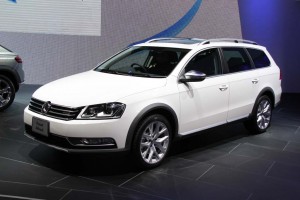
Volkswagen gained ground despite the European recession and aims to continue its upward swing with new models like the Passat Alltrack.
A day after Ford Motor Co. saw earnings plunge 57%, largely due to problems in recession-wracked Europe, Germany’s Volkswagen AG posted an 18% jump in second-quarter profits.
The maker more than offset the problems back home with strong demand in other key markets such as China, Russia and India – and the U.S., where VW products like the Passat are selling at a pace the maker hasn’t seen since the heyday of the original Beetle four decades ago.
“We can be satisfied with our business performance in the first six months,” Volkswagen AG Chief Executive Martin Winterkorn said in a statement. “Our strong position on world markets will help us to exceed the development of the overall market despite the challenging environment.”
VWAG saw its net profit for the second quarter jump to €5.64 billion ($6.84 billion), up from €4.78 billion a year ago. Meanwhile, revenues climbed 19%, to €48.1 billion.
For the first six months of 2012, the maker’s earnings are up 36%, revenues climbing 23%, so the second quarter saw the maker’s momentum slow a bit even if it outperformed key competitors struggling to deal with the European crisis.
PSA Peugeot Citroen yesterday revealed it lost €819 million (or $990 million) during the first half of the year. It has outlined an aggressive turnaround plan that includes closing an underutilized plant – but that could cause problems as the maker seeks a bailout from the French government.
Ford, meanwhile, reported an operating loss of $404 million on its European operations during the second quarter compared to a $176 million profit a year earlier. And Ford is warning it expects to lose $1 billion in Europe for all of 2012. General Motors is expected to report an even more substantial loss on its flailing Opel subsidiary next week.
(For more on Ford’s earnings, Click Here.)
Daimler AG yesterday reported an 11% decline in second-quarter earnings, meanwhile, to €1.51 billion ($1.83 billion), though it put the blame, as much as anything, on the cost of launching new models such as the A- and B-Class. Daimler insisted the numbers were “good,” all things considered, and stuck to its full-year earnings target, but Chief Executive Dieter Zetsche warned “The risks will more likely increase in the second half rather than decrease.”
While Zetsche is far from the only one worrying about an increasingly uncertain global situation, Wolfsburg-based Volkswagen, if anything, predicted things could get even better for the company in the second half.
The maker has been outpacing rivals in the slowly reviving U.S. market and it remains in a tight race with arch-rival General Motors for leadership in the fast-growing Chinese market. At the same time it released its Q2 earnings, in fact, VW formally announced the opening of its latest Chinese assembly plant, a Polo factory in Yizheng.
But even there, analysts caution, the situation is tenuous. For the past decade, China’s automotive market has been expanding at a high double-digit annual rate. Whether it will even reach 10% this year is under debate and the first quarter actually saw a modest slide.
VW officials did acknowledge the likelihood the European market would continue to decline. The company’s deliveries in Western Europe outside the home German market fell by 5.7% during the first half of the year.
But the maker has reason to crow. Even its weakest brand, Spanish-based Seat, managed to increase deliveries, and its Audi brand, in particular, is breathing down the necks of traditionally stronger luxury makers Mercedes-Benz and BMW.
Meanwhile, the second-quarter net earnings outpaced analysts’ estimates of €2.79 billion compiled by FactSet.
(Despite strong sales, VW likely to dip to third in global sales race for 2012. Click Herefor that story.)
Nonetheless, operating earnings actually missed their anticipated target and analysts warned that VW faces increased costs, in the near-term, as it presses forward with plans to develop a new “architecture” for its small and midsize vehicles that along could cost it €16 billion through 2016. All told, the group plans to invest €62 billion during that period on products and plants. That may explain why nervous European investors responded warily after the VW announcement, initially driving down the maker’s stock by more than 3%.
